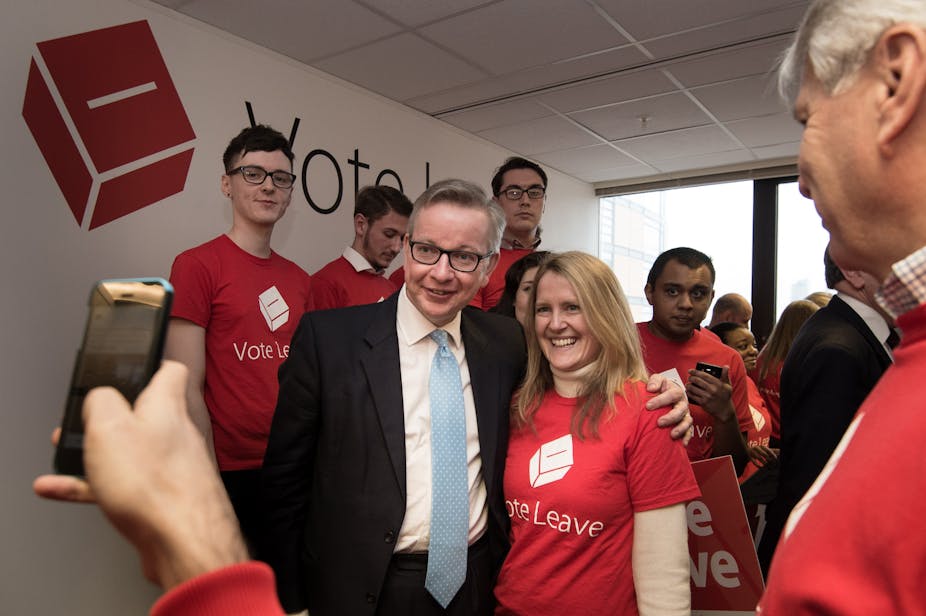The Electoral Commission has ruled that Vote Leave, the official campaign for leaving the European Union, breached campaigning rules during the EU referendum in 2016 and spent nearly £500,000 over the legal limit. Here’s what you need to know about the case.
Under British electoral law, two designated campaigns (one leave and one remain) had an official spending limit of £7m. There were a number of other independent campaigns, however, that operated with different spending limits. For example, Leave.EU, the campaign fronted by businessman Arron Banks and former (and future?) UKIP leader Nigel Farage, have already been fined by the Electoral Commission for failing to declare £77,380 in a spending return. Had that extra spending been declared, it would have pushed Leave.EU over its allotted limit of £700,000.
The commission was looking into whether Vote Leave effectively funnelled money through third-party campaigns when it hit its official limit. In particular, this case centres around donations to student Darren Grimes and his BeLeave campaign and another to the Veterans for Britain campaign.
It’s important to note that these donations are perfectly legal. Once an official campaign has reached its spending limit and effectively has surplus cash it can donate them to other campaigns. The crucial point, however, is that they can’t tell them how to spend that money. If they do collude with these other campaigns in a meaningful sense, the spending has to be reported as a part of the spending return of the official campaign.
The allegation was that Vote Leave had co-ordinated with these smaller campaigns, telling them how to spend their money. It is said to have instructed them to run targeted campaigning through AggregateIQ, a previously unknown tech start-up in Canada.
Fines to pay
The commission has fined Vote Leave £61,000, Grimes and BeLeave £20,000, and Veterans for Britain £250. This is after finding “significant evidence of joint working” between the organisations.
The evidence includes Vote Leave giving infrastructure support to Grimes when setting up BeLeave. It directed a Vote Leave contractor to build the BeLeave website and advised Grimes on website content. Grimes used Vote Leave facilities to film videos and take photos while Vote Leave instructed their legal director to draw up a constitution for BeLeave.
The commission ultimately concluded that:
BeLeave … appears to have had the benefit of Vote Leave data and/or data it obtained via online resources set up and provided to it by Vote Leave to target and distribute its campaign material. This is shown by evidence from Facebook that Aggregate IQ used identical target lists for Vote Leave and BeLeave ads, although the BeLeave ads were not run …Vote Leave and BeLeave told us that the BeLeave AIQ payments were donations, and Vote Leave had no influence over how BeLeave used them. We are satisfied that many parts of this explanation are not consistent with the evidence.
This means that the entire amount reported by Grimes and BeLeave – £676,015.37 – was “incurred in pursuance of a common plan with Vote Leave”. As such this should not have been treated as the spending of a separate campaign but included in Vote Leave’s spending return. This would bring the total spend of the Vote Leave campaign to £7,449,079. Nearly £500,000 over the legal spending limit.

It should also be noted that £20,000 of the total fine levied to Vote Leave was done so for refusing to cooperate with the Electoral Commission. It “failed, without reasonable excuse, to comply with a requirement imposed by the commission to produce documents by a specific date”.
What happens now?
Both Grimes and Vote Leave official David Halsall have been reported to the police and the commission has shared its evidence and investigation files with them in case any other offences may have been committed. These investigations, much like the Conservative election expenses affair from 2016 will trundle on. Do not expect a speedy outcome here.
In the shorter term, the war of words has begun. Vote Leave has suggested the report “contains a number of false accusations and incorrect assertions” and that the “supposedly impartial commission is motivated by a political agenda rather than uncovering the facts”. This response is as predictable as it is unhelpful.
The truth is that the Electoral Commission gets it in the neck across the political spectrum whenever a decision goes against any particular partisan position. Depending on who you ask, it’s a “Blairite swamp creation” or an organisation “which let the Tories of the hook”. If people are unhappy with the decisions that are being made, it might be worth considering that it’s because they got caught.
Finally, what of the integrity of the referendum result itself? In this, it feels useful to deal in knowns. We do not know, and will probably never know, whether circumventing these rules definitively swung the vote. We do know that the spending rules were circumvented and we also know that rules around election spending are being disregarded fairly regularly. We should also know that the fact that this happened (and continues to happen) is not good for democracy.
These are issues that, believe it or not, are bigger than Brexit. They are about the basis of institutions that are held as fundamental. If they continue to be challenged in this way, there is an urgent need for political actors from all sides to consider whether British electoral laws are fit for purpose.

